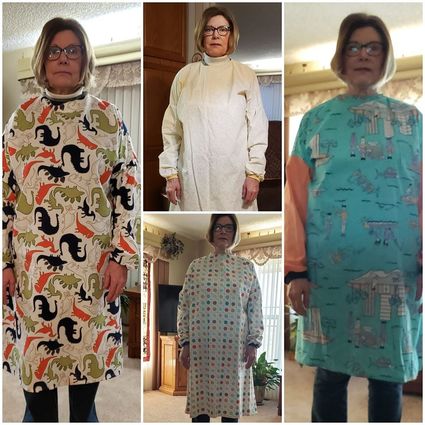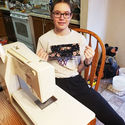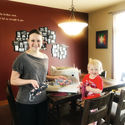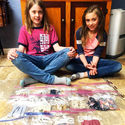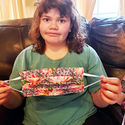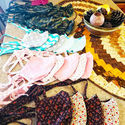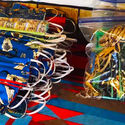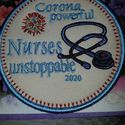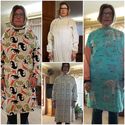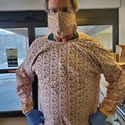Blaine County & Fort Belknap: Small Town People Helping in Big Ways
April 8, 2020
Over the past weeks, we have all likely heard news reports about healthcare professionals using recommended disposable equipment in unprecedented fashion. When these supplies were no longer keeping up with demands, nurses and other hospital professionals across the nation began reporting that they were at times working without adequate access to personal protective equipment (PPE). That's when community activism took the form of several mask construction projects.
In Blaine County, quilters, seamstresses, 4-H families, and others put their talents with a needle and thread to work to benefit local healthcare providers who found themselves in the unimaginable territory of facing a shortage in necessary protective gear.
One such individual is Louise Nissen, a quilter and seamstress who lives near Harlem. When she heard that masks and supplies of disposable scrubs were running short, she decided her quilts could wait and shifted her time to this more pressing need. Her actions prove that when we face adversity, each one of us finds our own way to cope and contribute.
Nissen, who has been sewing since she was quite young, explained her motivation: "Our medical staff are on the frontlines of this COVID-19 crisis, and they need every bit of support we can give them. So when the hospital sent out a plea for added protection to prolong the use of their N95 masks and to get other supplies like scrubs in reserve, I saw where my sewing ability could help."
Since her work as a quilter dictates that she maintain stockpiles of material, Nissen immediately dug into her reserves and set to work. "Laura Thornton, a registered nurse at Northern Montana Hospital, liked what I was doing, so she provided more fabric. Leanne Brewer, another registered nurse at the hospital from Chinook, delivered that material to my son Brandon, and he shuttled it to me."
Nissen sent masks back along that same shuttle line for those working at Northern Montana Hospital. Although these cloth masks do not keep the virus from entering the body, they do help trap droplets from a sneeze or cough. They also fit over the top of an N95 mask, prolonging the life of a medical professional's PPE during this time when disposable products are rapidly consumed.
Noted for their fluid resistance as well as their particulate and bacterial filtration efficiency when fitted correctly, N95 respirators and surgical masks (face masks) protect the wearer from airborne particles and from liquids with potential to contaminate the face. Because the edges of the respirator are designed to form a seal around the nose and mouth, achieving a very close facial fit, they are commonly used in healthcare settings and are often referred to as N95s.
Organizations like the Centers for Disease Control and Prevention (CDC), the National Institute for Occupational Safety and Health (NIOSH), and the Occupational Safety and Health Administration (OSHA) all regulate N95s. During this period with the COVID-19 outbreak, these organizations have claimed that the optimal way to prevent airborne transmission is to use a combination of interventions from across the hierarchy of controls, not just PPE alone. This recommendation has spurred other seamstresses in the county.
The cloth masks are not meant to replace the N95s but to provide an added, protective layer as described by the CDC. Because the cloth masks can be removed and sterilized during laundering, they essentially extend the life of the more expensive N95s, which are quickly becoming scarce.
Two members from the Community Quilters, Bonnie Hellman and Terry Grabofsky, also responded to a call from Jenni Pula to sew masks for the Sweet Memorial Nursing Home.
Grabofsky reported that the Community Quilters had discontinued gathering at their regular meeting location, the American Lutheran Church, when the social distancing guidelines went into effect, so when Pula contacted her, she and Hellman worked from home.
"The pattern I received was fairly easy to follow, but because bleach destroys elastic, we had to construct and sew fabric ties onto the masks. These were quite labor intensive, but once I got a rhythm going, the process went quickly," Grabofsky said.
She and Hellman made just over sixty washable and reusable masks with a pleat that enables them to fit over the N95s. These were delivered to the nursing home on Friday, March 27.
"Making the masks was a good way to use many of the small pieces of fabric that we had stored at the church, pieces leftover from various quilting projects," Grabofsky said.
Because Grabofsky is willing to sew additional masks if they are needed, individuals who are elderly or immune compromised can contact her at 357-2461 to request a mask.
Several 4-H families are also creating masks. Montana State University- Blaine County Agriculture and 4-H Extension Agent, Juli Snedigar reported that these will not only add to supplies for the nursing home in Chinook but will provide some for the Sweet Medical Center. They have plans to donate masks to the senior center in Harlem, as well.
During the week of March 23, Snedigar and Sarah Johnson, Blaine County's Family Consumer Science/4-H Agent, cut out material and assembled approximately 75 kits for their 4-H members. They sent these kits out on March 26 and began receiving completed masks by early in the week of March 30.
4-H youth who worked on the masks include Raynee Hasler, Hannah Van Voast, Isabelle Van Voast, Bailey Billmayer, Hannah Richman, Natalie Richman, and Emma Klingaman.
Besides extending appreciation to these young people, Snedigar stated, "We would like to thank Barb Sather, Renella Hansen, Connie Zanto, Valerie Frank, and any other generous community members that donated materials."
On the Fort Belknap Indian Reservation, Juanita Cole Crasco is another charitable individual who is providing leadership for mask making. "Six ladies are helping me," Crasco reported. "We have 450 masks so far; some completed, some delivered, and others cut out and ready to sew."
Crasco and her crew have been making homemade cloth masks to assist with some protection from the virus. "When I was asked to make the masks, I gladly accepted," she said. "We are an organization that wants to help Fort Belknap elders and others during this crisis, so we are volunteering our time. The lady that asked me to make masks works with the medical profession to ensure the type of masks we were making would be beneficial to us common people that are not working directly in surgery. We will continue to assist with our cloth masks for those that are forgotten about in the community," she said.
In addition to masks, Nissen has been sewing scrubs. On March 29, she reported that she was working on number eleven and has material to construct six more. Unlike paper, cloth scrubs like those Nissen is assembling can be sterilized and reused.
As a tribute to their services on the frontlines, Nissen designed and produced patches for two special Northern Montana Hospital nurses. The patch-which reads "Corona Powerful, Nurses Unstoppable 2020"-features an embroidered stethoscope along with an embroidered image of a corona virus. Dehna Busch, a recipient of one of the patches, expressed gratitude and appreciation for what she described as an "amazing and wonderful" gift.
"When God gives a person an ability to do something, I believe we have an obligation to use that talent for good," Nissen claims. "A talent is made to be shared."

Dr Smith at NMH found a matching mask and gown in our donations today! Our community rocks!!! He was so excited! These items made by our community are such a morale booster! Thank you Louise Nissen and Community.
Anyone with photographs of related projects is encouraged to send them to the Blaine County Journal-News-Opinion (bcjnews.itstriangle.com) so that they can be shared with the public.

